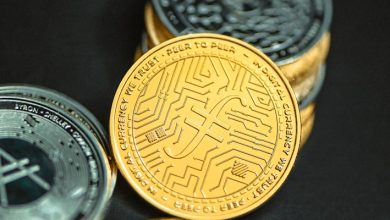The Impact of Decentralized Finance on New Token Creation

- Understanding Decentralized Finance (DeFi) and its Influence on Token Creation
- Exploring the Rise of DeFi and its Effect on the Creation of New Tokens
- The Evolution of Token Creation in the Era of Decentralized Finance
- Analyzing the Relationship Between DeFi and the Proliferation of New Tokens
- Challenges and Opportunities in Token Creation within the DeFi Ecosystem
- The Future of Token Creation: How DeFi is Shaping the Landscape
Understanding Decentralized Finance (DeFi) and its Influence on Token Creation
Decentralized Finance (DeFi) is a rapidly growing sector in the cryptocurrency space that is revolutionizing traditional financial services. DeFi projects aim to create an open and inclusive financial system that is accessible to anyone with an internet connection. One of the key aspects of DeFi is the ability to create new tokens on decentralized platforms, which has a significant impact on the cryptocurrency market.
Token creation in DeFi allows for the development of innovative financial products and services that were previously not possible in the centralized financial system. By leveraging blockchain technology and smart contracts, developers can create tokens that represent various assets, such as cryptocurrencies, real estate, or even digital art. These tokens can then be traded, lent, borrowed, or used as collateral in decentralized applications (dApps).
The influence of DeFi on token creation is profound, as it enables anyone to tokenize assets and participate in the global economy without the need for intermediaries. This democratization of finance has led to a surge in new token creation, with projects ranging from decentralized exchanges (DEXs) to tokenized real estate platforms. The ability to create tokens on decentralized platforms has opened up new opportunities for investors, developers, and users alike.
Exploring the Rise of DeFi and its Effect on the Creation of New Tokens
Decentralized Finance (DeFi) has been a game-changer in the world of cryptocurrency, revolutionizing the way we think about traditional financial systems. One of the most significant impacts of DeFi is the rise of new tokens being created on various blockchain platforms. This phenomenon has opened up a world of opportunities for developers, entrepreneurs, and investors looking to participate in the decentralized economy.
As DeFi continues to gain momentum, we are witnessing a surge in the creation of new tokens that are designed to serve specific purposes within the decentralized ecosystem. These tokens can represent anything from governance rights to liquidity provision, and everything in between. The flexibility and programmability of blockchain technology have made it easier than ever for individuals and organizations to launch their tokens and participate in the burgeoning DeFi space.
Moreover, the rise of DeFi has democratized access to financial services, allowing anyone with an internet connection to participate in decentralized lending, borrowing, trading, and more. This democratization has fueled the creation of new tokens that cater to a wide range of financial needs and use cases. From stablecoins to yield farming tokens, the DeFi ecosystem is teeming with innovation and creativity.
Overall, the rise of DeFi has had a profound impact on the creation of new tokens, ushering in a new era of financial innovation and experimentation. With decentralized finance continuing to evolve and expand, we can expect to see even more tokens being created to meet the growing demands of this dynamic ecosystem.
The Evolution of Token Creation in the Era of Decentralized Finance
In the era of decentralized finance, the process of token creation has undergone a significant evolution. With the rise of decentralized platforms and protocols, individuals and organizations now have more opportunities to create their own tokens with ease. This shift towards decentralized token creation has democratized the process, allowing for greater accessibility and innovation in the cryptocurrency space.
One of the key advancements in token creation within decentralized finance is the use of smart contracts. Smart contracts are self-executing contracts with the terms of the agreement directly written into code. By utilizing smart contracts, token creators can automate various aspects of token issuance, distribution, and management. This not only streamlines the token creation process but also enhances security and transparency.
Another important development in token creation is the concept of token standards. Token standards, such as ERC-20 and ERC-721, provide guidelines and specifications for the creation of tokens on the Ethereum blockchain. These standards ensure interoperability between different tokens and enable developers to build decentralized applications (dApps) that can interact seamlessly with various tokens.
Furthermore, the emergence of decentralized exchanges (DEXs) has revolutionized the way tokens are created and traded. DEXs allow users to trade tokens directly from their wallets without the need for intermediaries. This decentralized approach to token trading has increased liquidity and market efficiency, making it easier for new tokens to gain traction in the market.
Overall, the evolution of token creation in the era of decentralized finance has opened up new possibilities for innovation and experimentation in the cryptocurrency space. By leveraging smart contracts, token standards, and decentralized exchanges, individuals and organizations can create and trade tokens in a more efficient, secure, and transparent manner. This shift towards decentralized token creation is reshaping the landscape of finance and paving the way for a more inclusive and decentralized financial system.
Analyzing the Relationship Between DeFi and the Proliferation of New Tokens
The relationship between decentralized finance (DeFi) and the proliferation of new tokens is a complex and multifaceted one. DeFi has provided a fertile ground for the creation of a wide variety of new tokens, each with its own unique value proposition and use case. These new tokens often serve as the building blocks of the DeFi ecosystem, powering decentralized exchanges, lending platforms, and other innovative financial products and services.
One of the key drivers behind the surge in new token creation within the DeFi space is the concept of tokenization. Tokenization allows for the representation of real-world assets, such as currencies, commodities, and securities, as digital tokens on a blockchain. This process enables the seamless transfer of value and ownership, as well as the automation of various financial processes, all without the need for intermediaries.
Moreover, the decentralized nature of DeFi platforms has democratized access to token creation, allowing anyone with an internet connection to issue their own tokens and participate in the burgeoning DeFi ecosystem. This has led to a proliferation of new tokens, each aiming to address specific market needs or cater to niche audiences.
As the DeFi landscape continues to evolve and mature, the relationship between DeFi and the proliferation of new tokens is likely to become even more intertwined. Innovations in smart contract technology, token standards, and interoperability protocols are expected to further fuel the creation of new tokens and expand the possibilities for decentralized finance. In turn, these new tokens will continue to play a crucial role in shaping the future of finance and revolutionizing the way we interact with money and assets.
Challenges and Opportunities in Token Creation within the DeFi Ecosystem
Creating tokens within the DeFi ecosystem presents both challenges and opportunities for projects looking to innovate in the decentralized finance space.
One of the key challenges in token creation is ensuring that the new token has a unique value proposition that sets it apart from existing tokens. With the increasing number of tokens being created, standing out in the crowded DeFi market can be difficult. Projects must carefully consider how their token will provide value to users and differentiate itself from competitors.
Another challenge is ensuring the security and reliability of the token. Smart contract vulnerabilities and security breaches are a significant risk in the DeFi space. Projects must conduct thorough audits and testing to minimize the risk of exploitation and protect user funds.
Despite these challenges, there are also significant opportunities for projects in token creation within DeFi. The decentralized nature of the ecosystem allows for greater flexibility and creativity in designing tokenomics and utility. Projects can explore new token models, such as governance tokens or yield farming incentives, to attract users and build community engagement.
Additionally, the open-source nature of DeFi allows for collaboration and innovation among projects. Partnerships and integrations with other DeFi platforms can help expand the reach and utility of a new token, creating more opportunities for growth and adoption.
In conclusion, while there are challenges to overcome, the DeFi ecosystem offers a unique environment for token creation with the potential for innovation and growth. By carefully navigating these challenges and seizing opportunities for collaboration and creativity, projects can successfully launch new tokens that contribute to the evolving landscape of decentralized finance.
The Future of Token Creation: How DeFi is Shaping the Landscape
The future of token creation is being significantly influenced by the rise of decentralized finance (DeFi). DeFi is revolutionizing the way new tokens are being created and distributed, providing a more accessible and efficient alternative to traditional financial systems.
Decentralized finance platforms enable users to create tokens without the need for intermediaries, such as banks or financial institutions. This democratization of token creation has opened up new opportunities for innovators and entrepreneurs to bring their ideas to life in a decentralized manner.
One of the key ways in which DeFi is shaping the landscape of token creation is through the use of smart contracts. Smart contracts are self-executing contracts with the terms of the agreement between buyer and seller being directly written into lines of code. This technology allows for the automated and secure creation of tokens, reducing the need for manual intervention and increasing transparency.
Furthermore, DeFi platforms are enabling the creation of a wide range of tokens, from utility tokens that provide access to specific products or services, to governance tokens that give holders voting rights on platform decisions. This diversity in token offerings is fostering innovation and creativity in the cryptocurrency space.
Overall, the impact of decentralized finance on new token creation is profound. It is revolutionizing the way tokens are being created, distributed, and utilized, paving the way for a more inclusive and decentralized financial ecosystem. As DeFi continues to evolve, we can expect to see even more innovations in token creation that will shape the future of finance.



